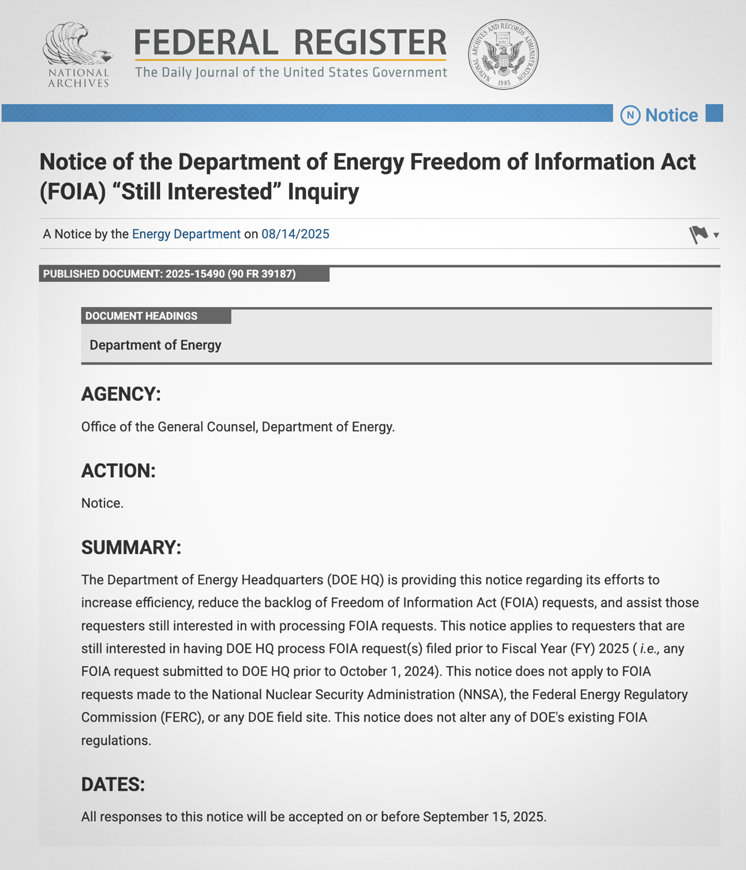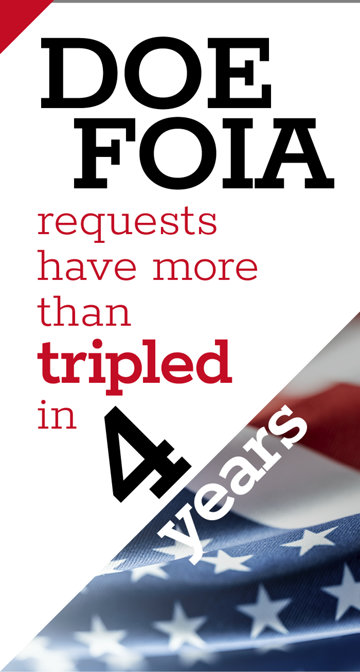The policy, dubbed a “still interested” inquiry, flicks a switch, closing requests if no confirmation arrives within 30 days.
Left unchallenged, the DOE’s unilateral decisions could all set a dangerous precedent.
This sudden policy shift matters—not just to a handful of long-pending FOIA requests, but to the fabric of government accountability.
FOIA requires agencies to do one of three things: release records, cite an exemption or state that no records exist. Demanding that requesters reconfirm interest simply isn’t in the statute.
The DOE’s action inevitably raises fundamental questions under established precedent, including the Supreme Court’s 2024 ruling in Loper Bright v. Raimondo, which emphasized that courts may not defer to agency interpretations lacking statutory backing—making DOE’s “still interested” demand ripe for challenge.

In its official notice, signed August 12, 2025, and published two days later, DOE justifies the measure as necessary housekeeping. FOIA requests have “more than tripled in the past four years,” topping 4,000 in fiscal 2024, with an expected 5,000 or more in 2025. The agency blames the surge on “vexatious requesters and automated bots” who “rarely respond to DOE inquiries … and contribute to processing bottlenecks.” The measure is framed as an effort to free up resources “to better serve the American people and focus [the DOE’s] efforts on more efficiently connecting the citizenry with the work of its government” by concentrating on active cases. (Never mind that, to many Americans, there’s a razor-thin difference between “connecting the citizenry” and flat-out conning it.)
On paper, the notice looks oh-so narrowly tailored—or so DOE insists—and limited to “headquarters” FOIA requests (not those pesky ones at National Nuclear Security Administration or the Federal Energy Regulatory Commission or any of the DOE’s own field sites), provided the requests are “still open” and not yet dragged into court. According to the Federal Register notice, DOE will accept confirmation emails—but only if they include the official DOE “control number” assigned to your request and an explicit statement that you still want it processed—sent to StillInterestedFOIA@hq.doe.gov.

But critics contend the policy is a shortcut around the law. In a striking blog post, the Cato Institute slams the demand as “facially unlawful,” noting: “The FOIA statute itself does not provide legal authority for federal agencies or departments to issue ‘still interested’ letters to FOIA requesters.” Indeed, the practice dates to 2015 via Justice Department guidance—not legislation—and Loper Bright reinforces that agencies may not stretch statutory gaps. Further, Cato asserts that agencies cannot legally close valid FOIA requests without “a final determination letter to the requester” that either asserts an exemption, provides documents or reports that “no responsive records were located.”
DOE, by contrast, insists the policy is a pragmatic necessity, citing the agency’s growing workload and even complaints of being inundated by requests from automated bots.
Adding fuel, FOIA practitioners filed fresh requests—via MuckRock—for DOE’s internal decision-making rationale. The requests, among other things, seek records about how DOE decided to issue a single deadline en masse, rather than notifying requesters individually, and query what parts of 5 USC § 552 or other sources authorize cutting off pending requests for failure to reconfirm.
Left unchallenged, the DOE’s unilateral decisions could all set a dangerous precedent, FOIA luminaries warn. Cato writes: “Congress and the courts should not allow [agencies] to actively subvert the FOIA statute by letting agencies … use an extra-legal administrative measure to close long-standing FOIA cases that the government itself has failed to respond to,” amounting to a constitutional squeeze on public access.
As requesters stare down their inboxes and the September 15 deadline looms, this battle over a seemingly bureaucratic housekeeping measure could reverberate across the transparency landscape. Will courts allow FOIA practice to be altered in ways the statute does not permit—effectively imposing a reconfirmation requirement never enacted by Congress—or will this “still interested” gambit mark the opening act in reclaiming FOIA’s core mandate?
One hopes this story demands we stay interested—if for no other reason than to remind Washington that transparency isn’t theirs to ration.






















